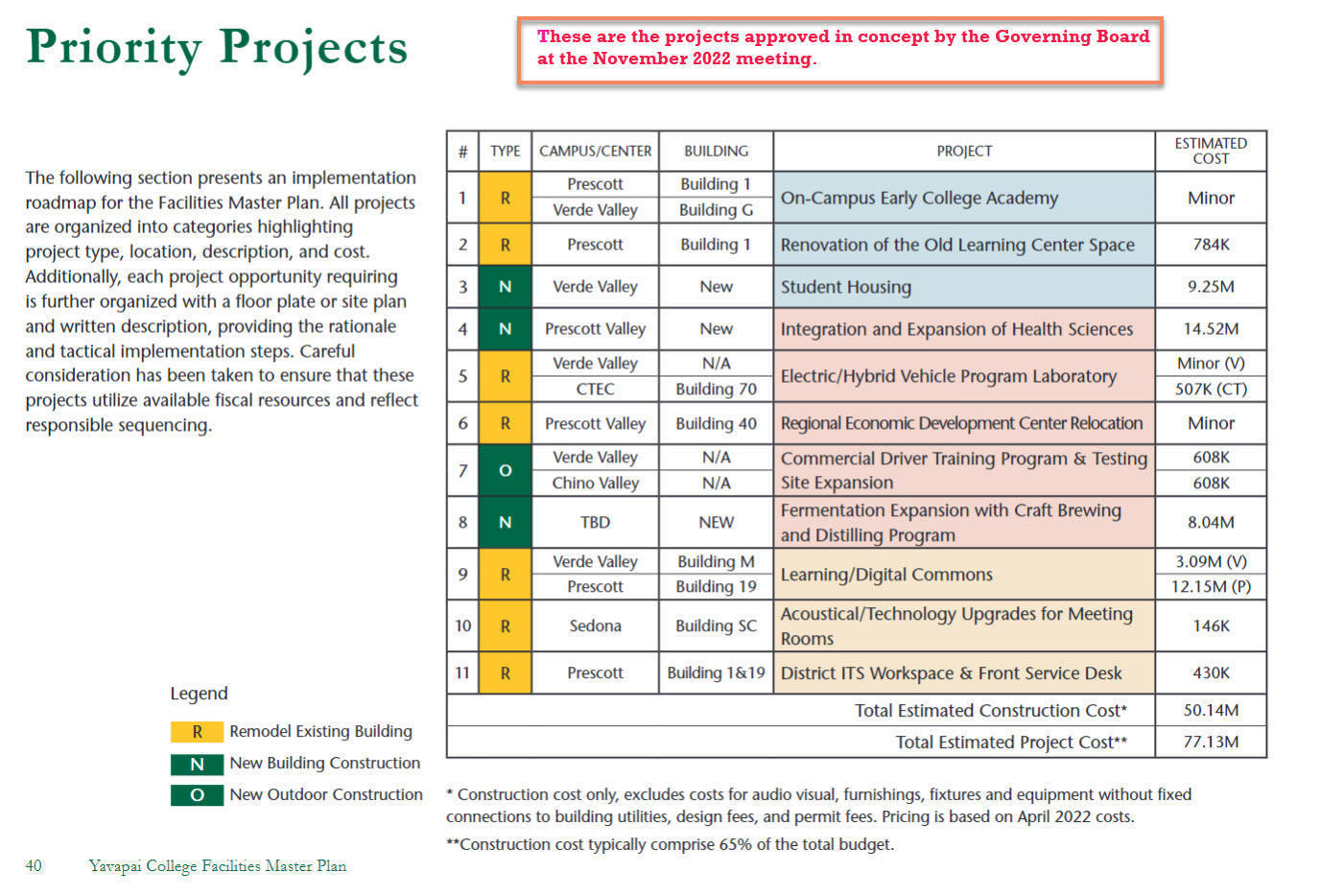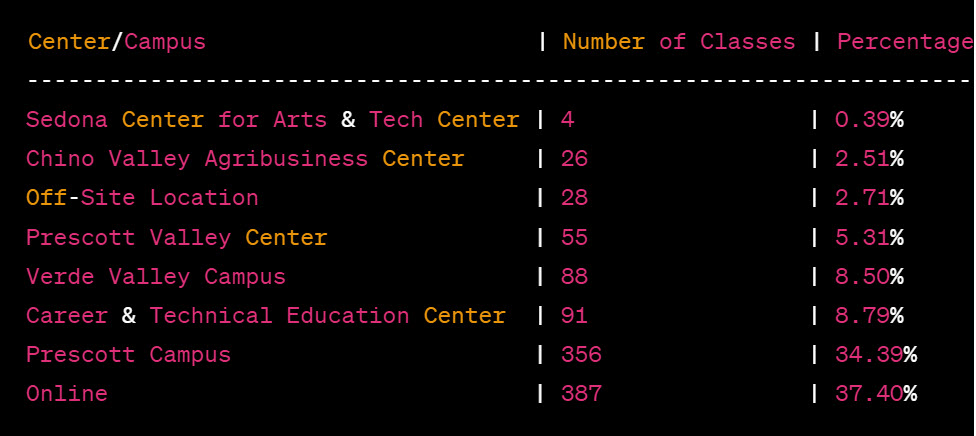Author Archive for R. Oliphant – Page 27
YAVAPAI COLLEGE ISSUES BRIEF UPDATE ON PROGRESS ON VERDE VALLEY CAMPUS RV PARK PROGRESS
YAVAPAI COMMUNITY COLLEGE TAKES PRELIMINARY STEPS TOWARD CONSTRUCTION OF NEW 30,000 SQUARE FOOT HEALTH SCIENCES CENTER AT PRESCOTT VALLERY CENTER
Goal is to begin construction in August 2024 – (Estimated cost runs from $20 to $22 million) – This is second major project in last few months announced to expand west side Community College footprint as $10 million already allocated for separate CTEC expansion; College will seek additional state and federal support for Science Center project
Yavapai Community College announced in its August Facilities Management Newsletter that it has begun moving forward with its plans to build an estimated $20 to 22 million Sciences Center to be located at the College’s Prescott Center. (Click here to take link to newsletter.)
The College says that it is working with “SPS + Architects” and has begun programming for a new three story 30,000 square foot facility that will house Nursing and EMS training. According to the Facilities Management Report, the College hopes to obtain additional funding from the state and federal governments. It is unclear whether the project is actually contingent on obtaining those funds.
It also hopes to break ground for the Center in August 2024. If it does so without state or government aid, it will most likely turn to issuing Special Revenue Bonds of some sort because they do not need approval from residents before they are issued. The College has used this approach before on various projects.
The EMS program, now located on the Prescott Campus, will be moved to the new facility. The vacated Prescott Campus space will be filled by building additional athletic offices to meet the needs of the burgeoning athletic program.
The College said it will continue the existing nursing program on the Verde Campus.
The announcement of the multi-million dollar project is notable for a couple of reasons: First, in the May 2024 approved budget, this project was listed as beginning at the earliest in the 2026-2027 academic year. For unexplained reasons, it has suddenly been moved to begin two years earlier, in August 2024.
Second, this appears to be a missing part of the Master plan originally hatched by the Prescott based College executives back in 2010 where they received Governing Board approval for allocating $103 million or more in capital development with less than 5% going to Sedona and the Verde Valley. At that time, it was expected that all nursing training would be centralized at the Prescott Valley Center, including the nursing program on the Verde Valley Campus.
Fortunately, Sedona/Verde Valley advocates launched a successful campaign to save the nursing training on the Verde Valley Campus. Another factor saving the Verde Valley Campus program was that discussions with Northern Arizona University and others potentially involved in the Prescott Valley project fell apart, which brought a halt to enormous expansion plans. However, the College moved ahead with renovation of a portion of the Prescott Valley Center for its nursing program.
In justifying the 30,000 square foot expansion, College consultants claim that based on projected enrollment growth in the Health Sciences, and “the advantages of bringing all Health Sciences programs together into one building,” a new integrated Health Sciences center is needed, which focuses on partnerships and interdisciplinary pedagogies that provide students with an improved understanding of healthcare practices to help them secure better jobs. (Emphasis added.)
The following is the announcement made by the College:



WHAT WE KNOW SO FAR ABOUT THE RV PARK PROJECT ON THE VERDE CAMPUS
Community College ignores Blog’s most recent request for information to update RV park’s status as Fall semester begins August 12
Obtaining information from Yavapai Community College can be quite challenging, as the institution seems to uphold a strict policy of confidentiality when it comes to its internal operations. Regrettably, despite requests from the Blog to the College’s public relations department, our recent inquiries about the current status of the RV park have gone unanswered. As a result, the residents of Yavapai County are left uninformed about a variety of matters, including the RV park’s readiness status by August 12, the rental costs of a student parking an RV in the park, lighting and security measures for the park, or the type and cost of the four purchased RVs (if any were purchased).
To address this issue and shed light on these matters, the Blog remains dedicated to pursuing any available channels of information and will strive to keep the community informed as soon as we receive any additional information.
T he Blog understands the importance of transparency in the decision-making processes of an institution like Yavapai Community College, and it will continue its efforts to ensure that residents have access to the information an institution should normally furnish its taxpayers. Rest assured, the Blog’s commitment to delivering accurate and up-to-date information remains unwavering.
he Blog understands the importance of transparency in the decision-making processes of an institution like Yavapai Community College, and it will continue its efforts to ensure that residents have access to the information an institution should normally furnish its taxpayers. Rest assured, the Blog’s commitment to delivering accurate and up-to-date information remains unwavering.
The following is what the Blog has learned so far from a wide variety of reliable sources about the RV park on the Verde Valley Campus
Here is what the Blog knows so far:
-
The Blog is unable to find in the Community College budget for the past or present years an entry clearly identifying by name the Verde Campus RV park and its estimated budgetary construction cost.
-
On October 18, 2022, at the Community College’s District Governing Board meeting the question of an RV park at the Verde Valley Campus of Yavapai Community College was discussed for about two or three minutes. During the brief discussion, then Third District Yavapai Community College Representative Paul Chevalier, in whose district the RV park would be constructed, said he opposed the idea. He was concerned that using RVs for housing might “lower the quality of the look of the campus.” Board Chair, Deb McCasland fully supported the idea. No formal vote was taken.
-
During March 2023, without public notice or a formal Governing Board vote on the project the Blog can identify, construction was discreetly started on the Verde Valley Campus to build a ten vehicle RV park for staff and students. Heavy equipment began leveling the surface for the RV lot on Campus land adjacent to the vineyard.
-
On May 17, 2023, through its own press release, the College belatedly publicly announced its decision to construct a 10-space Recreational Vehicle Park on the Verde Valley Campus. According to the press release, the College intends to purchase four RV units and initially offer them for rent to employees and possibly students. Additionally, the remaining six pads will be exclusively reserved for employees and possibly students who already possess their own RVs. Employees will have priority over students. It will have such amenities as a patio, gazebo, and dog run. Occupants will have access to an onsite laundry facility and, “along with their neighbors,“ a well-maintained gravel road.
-
In an article dated May 17, 2023, which appeared in the Verde Independent, it reported it was told by the College that “The RV Park is a Yavapai College District Governing Board-approved project.” It also told the Independent that the RV park will have “electrical hookup and septic available.” It appears that the decision was made to forgo connecting the RV park’s sewer system to the neighboring Cottonwood (or Clarkdale) sewer system and install a septic system because it would be too costly. It will drain sewerage into a septic system in the desert area adjacent to the park.
-
On May 30, 2023, Clint Ewell granted an interview to Phoenix Channel 3 News reporter Casey Torres about the RV park. She reported the College will rent the RVs on the Verde Campus for $500 a month for “RV owners.” It was unclear what the College would charge for renting one of the remaining six spaces. Some viewers were surprised that during this interview College Vice President of Finance and Administrative Services, Dr. Clint Ewell, appeared to emphasize the projects as being aimed at student housing rather than employees although he noted at least three employees had shown an interest in the RV park.
-
In a story posted on Azcentral.com on July 5, 2023 (updated July 21, 2023) Clint Ewell is quoted as saying: “It’s really been in the last maybe two to three years that we’ve started to feel like (the cost of housing) is starting to influence our ability to attract new people.” “Over time, I think this becomes a great way for us to onboard new employees and give them a place to land and get the lay of the land before they go out looking for a house to buy or rent,” he said.
-
Present: Recent requests from the Blog to the College’s PR department to provide Yavapai County residents via the Blog an update on the status of the park as fall semester approaches have been ignored. All of the news stories indicated the goal was to have the park ready by the start of the fall 2023 semester.
COMMUNITY COLLEGE LAUNCHES SEARCH FOR PERSON TO FILL THE NEW POSITION OF PROVOST TO REPLACE VP DIANE RYAN
Provost has team of 13 and oversees Strategic Initiatives, Academics and Instruction, Instructional Support, Lifelong Learning, and the Performing Arts Center – Reports directly to the College president
Yavapai Community College has launched its search for its newly created position of Provost to replace former Vice President Dr. Diane Ryan. Dr. Ryan resigned unexpectedly June 29 from the position of Vice President of Academic Affairs.
According to the College, the Provost will serve as a member of the Executive Leadership Team and direct its academic programs. The Provost will also oversee Strategic Initiatives, Academics and Instruction, Instructional Support, Lifelong Learning, and the Performing Arts Center. The Provost will be accountable for ensuring accreditations, curriculum development, assessment processes, transfer articulation, general education, community education, and dual credit programming.
A portion of the position, as listed by the Community College, appears below. Click here if you prefer to review the entire position description as listed.
POSITION SUMMARY
Location: Prescott, AZ | Job Type: Full Time | Job Number: 2023-00452 | Department: President’s Office
Opening Date: 07/27/2023
The Provost serves as part of the Executive Leadership Team and directs the academic programs of the institution in matters pertaining to student success and support in conjunction with the Chief Workforce Innovation Officer (CWIO).
Reporting directly to the President, the Provost leads five direct reports and a team of thirteen.
The position oversees Strategic Initiatives, Academics and Instruction, Instructional Support, Lifelong Learning, and the Performing Arts Center and sustains excellence in all aspects of educational offerings. The Provost provides dynamic leadership and administrative oversight to the college academic departments and academic support services with the members of the Executive Leadership Team, planning, policy and budget development, and management for a comprehensive academic affairs program to meet the needs of a diverse, growing student body. Overall responsibilities include academic planning, bringing vision and strategic leadership to a broad range of key initiatives including enrollment management, online learning, utilization of open educational resources and development of an integrated learning core that connects academic and student service operations and initiatives to improve student access, retention, progression and completion.
The Provost will be accountable for ensuring accreditations, curriculum development, assessment processes, transfer articulation, general education, community education, and dual credit programming. In this capacity, they also provide oversight for Academic Divisions such as Arts and Humanities; Professional Programs and Visual and Performing Arts; Math, Science, and Computer Technology and Instructional Support. In addition, the Provost will represent the College on state and local educational organizations, Boards and committees as assigned.
Minimum Expectations & Requirements
-
-
- Earned Master’s degree from a regionally accredited post-secondary institution
- Three (3) or more years’ experience at the Vice President level or equivalent in academic affairs in higher education
- Five (5) or more years of progressive responsibility for instructional, administrative leadership experience in a higher education institution, including the supervision, evaluation, and mentoring of Staff and Faculty
- Track record in effective strategic leadership, demonstrated by tangible and measurable outcomes • Budget management experience, including resource allocation, strategic planning and implementation
- Experience in accreditation, curriculum development and delivery formats, assessment, and instructional program evaluation
-
Preferred Skills & Abilities
Earned Doctorate degree from a regionally accredited post-secondary institution
Proven ability to thrive in a progressive, forward-thinking, high-energy and highly collaborative work environment
Teaching experience, preferably at a community college
Experience working with/for Governing Boards
Proven excellent communication skills, interpersonal skills, and a demonstrated commitment to student success
Visionary, servant leader with a history of collaborative relationships and inclusive leadership and management style
Experience in program development, strategic planning and ensuring accountability among individuals or teams
Committed student-centered leader who exemplifies sound judgment, creativity, openness, flexibility, integrity, introspection, resourcefulness, and humility
Data-informed decision-maker with a high degree of emotional intelligence
Demonstrates a strong awareness of current pedagogical trends, technological advancements, and potential future opportunities.
Proven history of successfully guiding, coaching, and advancing staff to higher levels of performance and achievement.
YAVAPAI COMMUNITY COLLEGE ISSUES STATEMENT DISTANCING ITSELF FROM THE ARIZONA COLLEGE REPUBLICANS UNITED CONVENTION HELD JULY 30 IN PRESCOTT
Three days before the event the College declared it had no affiliation with the group and had not authorized the group to use its name or logo
Three days before the Arizona College Republicans United “Second Annual State and National Convention” was being held at the Prescott Vibes, Yavapai Community College issued a short statement distancing itself from the group. The statement read:
“Yavapai College has been made aware of a July 30 College Republicans United event and wishes to clarify that Yavapai College is not affiliated in any way with the event. Yavapai College has not authorized this group to use the College’s name or logo. Additionally, there is no sanctioned Yavapai College student club or other sanctioned Yavapai College organization connected to this group.” (Click here to read the College announcement.)
No additional information further explaining the reason for the statement was forthcoming from the College.
Press reports about the event had raised concerns about the Republican group’s alleged association with far-right speaker Nick Fuentes and its history of hosting white nationalist speakers. Embry University in Prescott appeared to take a silent stand by much earlier rejecting without comment the group’s request to use its site for the convention. The Hassayampa Inn in Prescott had also earlier announced that it would not be hosting the event.
Moreover, the Maricopa County Republican party had publicly distanced itself from the controversy surrounding the event, issuing a statement on Twitter clarifying that they “never authorized, sponsored, or promoted” the upcoming July 30 College Republicans United convention. The party’s stance appears to reflect a commitment to distancing themselves from any connections to controversial figures and events, emphasizing their dedication to a more inclusive and respectful political atmosphere.
NURSING PROGRAM DOMINATES FALL 2023 REGISTRATIONS AT YAVAPAI COMMUNITY COLLEGE’S VERDE VALLEY CAMPUS
Most classes already full or nearly full weeks before fall semester begins
 As Yavapai Community College gears up for the Fall 2023 semester, enrollment data indicates that the nursing program at the Verde Valley Campus has become that Campus’s undeniable magnet. The figures from the last week of July reveal an overwhelming dominance in registrations for the nursing program, with 17 classes either completely filled or nearing full capacity. In contrast, most of the remaining 70 academic offerings are struggling to match anywhere near the interest seen in the nursing program, barring a few exceptions.
As Yavapai Community College gears up for the Fall 2023 semester, enrollment data indicates that the nursing program at the Verde Valley Campus has become that Campus’s undeniable magnet. The figures from the last week of July reveal an overwhelming dominance in registrations for the nursing program, with 17 classes either completely filled or nearing full capacity. In contrast, most of the remaining 70 academic offerings are struggling to match anywhere near the interest seen in the nursing program, barring a few exceptions.
The demand for the Verde Valley Campus nursing program most likely reflects a significant paradigm shift in the field of higher education. Traditionally, some fields like liberal arts, business, and sciences have often dominated college enrollments. However, the enrollment data at the Verde Valley Campus shows the increasing appeal of healthcare-related vocations, particularly nursing, among students seeking promising career opportunities in the ever-expanding healthcare industry.
The ongoing global health challenges, combined with the aging population, have fueled a growing need for skilled healthcare professionals, especially nurses. The Verde Valley Campus nursing program’s popularity may stem from the recognition of this demand, with students embracing the program as a viable pathway to make a positive impact on their communities’ well-being and health outcomes.
A key driving force behind the nursing program’s success at the Verde Valley Campus is likely a commitment to providing top-tier nursing education. The Verde Valley Campus program boasts a team of experienced and highly qualified faculty members who bring a wealth of expertise and practical knowledge to the classroom. Furthermore, the campus is now equipped with state-of-the-art facilities, simulation labs, and clinical opportunities that ensure students receive hands-on training and exposure to real-world scenarios.
The response to the nursing program’s fall 2023 registrations indicates a bright future for Verde Valley Campus healthcare offerings. As the College adapts to meet the growing healthcare demand, it should explore opportunities to expand and enhance the nursing program on the Verde Valley Campus further, ensuring that it continues to produce an even greater number of well-prepared, compassionate, and skilled nursing professionals.
YAVAPAI COMMUNITY COLLEGE’S 2023 VOLLEYBALL TEAM WELCOMES 18 NEW ATHLETES; NO ONE RETURNING FROM LAST YEAR’S TEAM; FIVE RECRUITS FROM FOREIGN COUNTRIES (THREE FROM YAVAPAI COUNTY)
Adds three students from Poland, one from Turkey, and one from Montenegro; Recruits also come from Montana, Florida and Utah
 Yavapai Community College has set the stage for an exciting season as it welcomes 18 talented student-athletes to its 2023 Volleyball team. This is the second year for head coach Chelsey Lucas and assistant coach Zaquae Downtown.
Yavapai Community College has set the stage for an exciting season as it welcomes 18 talented student-athletes to its 2023 Volleyball team. This is the second year for head coach Chelsey Lucas and assistant coach Zaquae Downtown.
One remarkable aspect of this year’s recruiting effort is the exceptional diversity within the team. Hailing from various corners of the globe, five gifted student-athletes have made Yavapai their new home, arriving from countries as far-reaching as Poland, Turkey, and Montenegro. Additionally, the team has tapped into talent pools in different states, successfully recruiting standouts from Florida, Utah, and Montana. This melting pot of talent promises to bring a fascinating mix of playing styles and cultural influences to the volleyball court.
Three outstanding student-athletes have been selected from Yavapai County itself, constituting approximately 17% of the team. While the number from the County fell short of the 25% target set by the athletic department, the dedication and passion of these homegrown players should add a special flair to the team’s composition.
As the 2023 Volleyball season approaches, anticipation and excitement build around this diverse and talented group of athletes.
The following is a list of the members of the 2023 Volleyball team:
Bella Reach | Outside Hitter | Freshman | Cave Creek, Arizona. High School: Reach graduated from Cactus Shadows High School in May of 2023. Personal: Reach was born in Scottsdale, Arizona, on November 13, 2004.
Jezebel Rivas | Libero | Freshman | Goodyear, Arizona. High School: Rivas graduated from Millennium High School in May of 2023; Personal: Rivas was born in Maricopa, Arizona, on January 23, 2005. Her hobbies include cooking, baking, and going to the lake. In the future, Rivas plans to earn a major in veterinary medicine.
Jaydyn Rayburn | Libero/Defensive Specialist | Freshman | Camp Verde, Arizona: High School: Rayburn graduated from Camp Verde High School in May of 2023. During her high school career, she tallied over 1,200 digs and 98 aces while earning North Central Region Defensive Player of the Year honors twice in addition to All-State Honorable-Mention honors. *Personal: Rayburn was born in Prescott, Arizona, on February 18, 2005. Her hobbies include lifting and being outdoors and, in the future, she plans to study nursing.
Rylee Carnes | Setter/Defensive Specialist | Freshman | Payson, Arizona. High School: Carnes graduated from Payson High School in May of 2023. During her junior and senior seasons, she earned Second-Team All-Region honors in addition to being ranked third in assists in 3A East as a senior. During her sophomore season, she helped lead her team to the state tournament while earning Honorable Mention honors. Personal: Carnes was born in Scottsdale, Arizona, on April 14, 2005. Her hobbies include hunting, hiking, playing beach volleyball, and being around her friends and family. While at YC, she plans to study radiology.
Michalina Oles | Right Side Hitter | Freshman | Krakow, Poland: High School: Oles graduated from SMS Wieliczka in May of 2023. While there, she earned a bronze and silver medal at the Polish Nationals. Personal: Oles was born in Krakow, Malopolska, Poland, on March 20, 2004. Her hobbies include literature, manga and anime, and traveling.
Zofia Ciejka | Libero | Freshman | Chotomow, Poland. High School: Ciejka graduated from Liceum ogólnoksztalcace imienia Marii Konopnickiej in May of 2023 where she earned a championship. Personal: Ciejka was born in Warsaw, Poland, on June 1, 2004.
Kadyn Dahlke | Right Side Hitter | Freshman | Phoenix, Arizona: High School: Dahlke graduated from Cactus Shadows High School in May of 2023. She earned First-Team All-Region honors during her freshman and sophomore seasons and was one of prep volleyball’s players to watch in 2023. Personal: Dahlke was born in Bonsall, California, on July 20, 2005. Her hobbies include shopping, reading, and dancing and, in the future, she plans to earn a major in psychology.
Efsun Semerci | Setter | Sophomore | Ankara, Turkey: High School: Semerci graduated from Hazirlik High School in May of 2022. Before Yavapai: Before becoming a Roughrider, Semerci previously attended Lamar Community College. Personal: Semerci was born in Ankara, Turkey, on February 13, 2004. Her hobbies include listening to music, playing piano, hanging out with her friends, and working out.
Teylor Leauanae | Outside Hitter/Defensive Specialist | Sophomore | Provo, Utah. High School: Leauanae graduated from Timpview High School in May of 2022. She played three years of varsity volleyball, earned All-Region honors twice, and helped lead her team to a 5A state title in 2020. Before Yavapai: Before becoming a Roughrider, Leauanae previously attended Casper College. Personal: Leauanae was born in Glendale, Arizona, on March 29, 2004. Her hobbies include hiking, running, and hanging out with her friends and family. While at YC, she plans to earn her associate’s degree.
Inga Turner | Middle Blocker | Freshman | Bigfork, Montana. High School: Turner graduated from Bigfork High School in June of 2023. While at Bigfork, she earned First-Team All-Conference and First-Team All-State honors twice. Personal: Turner was born in Portland, Oregon, on June 6, 2005. Her hobbies include track, wake surfing, and snowboarding. While at YC, she plans to study business.
Sophia Smith | Libero | Freshman | Phoenix, Arizona. High School: Smith graduated from Shadow Mountain High School in May of 2023. As a senior, she earned First-Team All-Region and MVP honors. Personal: Smith was born in Phoenix, Arizona, on May 20, 2004. Her hobbies include snowboarding, hanging out with her friends, and going to the gym. In the future, she plans to study dental hygiene.
Teodora Bulatovic | Setter | Freshman | Tivat, Montenegro. High School: Bulatovic graduated from High School Mladost in June of 2023. As a senior, she helped lead her team to a bronze medal at the junior championship while knocking off the league champion from the previous six years. She also helped lead her team to a second-place finish in a 20-team tournament. Personal: Bulatovic was born in Kotor, Montenegro, on October 24, 2004. Her hobbies include reading, listening to music, biking, and going to the gym.
Emily Hogg | Right Side Hitter | Freshman | Scottsdale, Arizona. High School: Hogg graduated from Horizon High School in May of 2023. Hogg helped lead her team to state championships during her junior and senior seasons. Personal: Hogg was born in Scottsdale, Arizona, and her hobbies include shopping and watching movies.
Erica Graves | Middle Blocker | Freshman | Camp Verde, Arizona. High School: Graves graduated from Camp Verde High School in May of 2023. She earned Offensive Player of the Year honors in 2021 and First-Team All-Region honors in 2022. Personal: Graves was born in Bullhead City, Arizona, on July 25, 2005. Her hobbies include being outside and hanging out with her friends.
Hannah West | Outside Hitter | Freshman | Prescott, Arizona. High School: West graduated from Trinity Christian High School in May of 2023. As a senior, West led her team to a state championship with a .390 hitting percentage, All-State honors and Player of the Game honors in the state title match. Personal: West was born in Mesa, Arizona, on September 10, 2004. Her hobbies include hiking, camping, backpacking and photography. In the future, she has career aspirations of becoming a child life specialist.
Danica Mcdonald | Middle Blocker | Freshman | Chino Valley, Arizona. High School: Mcdonald graduated from Chino Valley High School in May of 2023. As a senior, she earned First-Team All-Region honors while leading D3 in blocks with 73. Personal: Mcdonald was born in Phoenix, Arizona, on July 14, 2005. Her hobbies include babysitting, hiking, and swimming. She plans to major in education and attain a master’s in special education.
Eva Payne | Setter | Freshman | Riverton, Utah. High School: Payne graduated from American Preparatory Academy Draper 3 in June of 2023. As a senior, she earned All-Star honors while leading her team to an undefeated record in region play, winning the region for the first time in school history. She also earned Offensive Player of the Year honors. Personal: Payne was born in Albuquerque, New Mexico, on October 23, 2005. In the future, she wants to study early childhood education.
Antigone Colon | Right Side/Middle Hitter | Freshman | Ocala, Florida. High School: Colon graduated from La Cueva High School in May of 2021. Personal: Colon was born in Glendale, Arizona, on July 2, 2003. She enjoys watching movies and plans to major in kinesiology.
YAVAPAI COMMUNITY COLLEGE HONORS A LEGACY OF NURSING SUCCESS: A VERDE VALLEY FAMILY WITH GENERATIONS OF NURSING DEGREES
Three Generations, One Passion: Celebrating the Nursing Journey of Gail McCracken, Jamie, Jodie and Alexa

CONGRATULATIONS!
Yavapai Community College issued a compelling press release, thoughtfully penned by JJ McCormack, on July 17. The release narrates the inspiring journey of four remarkable women from the Verde Valley. Grandmother Gail McCracken, daughters James and Jodie, and granddaughter Alexa. (You may read JJ McCormack’s press release by clicking here.)
The press release captures the passion and determination that fueled these women’s pursuit of their dreams in the nursing profession. It shines a light on the transformative impact of the College’s nursing program, empowering these talented women to embark on fulfilling careers in healthcare.
It all began in 1985 when Jamie (Elliot) and Jody (Hilde), the daughters of Gail McCracken, set the foundation for a remarkable family legacy in healthcare by obtaining their nursing certificates from Yavapai Community College on the Prescott Campus.
A few years later, in 1992, Gail McCracken (today a remarkable 78-year-old grandmother), completed her nursing training at the Verde Campus. Her pursuit of nursing exemplified a lifelong commitment to caring for others, leaving an indelible mark on the field of healthcare.
Now, as we fast-forward to the present year, 2023, a new chapter in this extraordinary family’s journey unfolds. Alexa Rodriguez, the granddaughter, stands as a shining testament to the values that the family holds dear. With unwavering determination, she attended the Verde Campus and received her nursing certificate this spring, carrying the torch of excellence into the future.
Together, these three generations exemplify the spirit of dedication, passion, and lifelong learning. Their collective journey highlights the transformative power of education and the significant impact individuals can make in the world of nursing.
Long-time residents of the Verde Valley may fondly remember Gail McCracken as a successful restaurateur before embarking on her journey in nursing. As an IV specialist, she honed her skills and expertise, eventually operating a non-profit organization, the Verde Valley Emergency Medication Assistance Program. Through this endeavor, Gail provided essential medicine to those in need, ensuring that no one was left without proper healthcare.
Meanwhile, Jamie has made a significant impact on the community by managing a residential group home in Clarkdale, offering a nurturing and supportive environment for its residents. Her compassionate care has undoubtedly touched the lives of many individuals and families, creating a positive ripple effect in the area.
Alexa will be starting a new job soon at Verde Valley Medical Center.
The story beautifully embodies the unwavering drive and determination of a family that aspired to achieve professional success amidst numerous challenges. Through their resilience and passion, this family not only overcame personal obstacles but also contributed to the success of their community, leaving an enduring impact on the lives of those they touched.
MARICOPA COMMUNITY COLLEGES PARTNER WITH SEMICONDUCTOR INDUSTRY AS IT STRUGGLES TO OBTAIN SUFFICIENT WORKFORCE IN ARIZONA
Maricopa Community College set to train 4,000 to 6,000 semiconductor technicians from the local workforce over the next few years as demand escalates
 According to a July 14 article in the Capitol Times by Steven R. Gonzales, Chancellor of the Maricopa County Community College District, two of the three largest semiconductor manufacturers in the world have announced a combined total of nearly $50 billion in new investments in Arizona, enabling the construction of multiple new, expansive manufacturing hubs. (To read the Capital Times article please click here.) He writes that “these companies have turned to the Maricopa County Community College District” for training assistance.
According to a July 14 article in the Capitol Times by Steven R. Gonzales, Chancellor of the Maricopa County Community College District, two of the three largest semiconductor manufacturers in the world have announced a combined total of nearly $50 billion in new investments in Arizona, enabling the construction of multiple new, expansive manufacturing hubs. (To read the Capital Times article please click here.) He writes that “these companies have turned to the Maricopa County Community College District” for training assistance.
Gonzales says that “the college is currently working to train 4,000 to 6,000 semiconductor technicians from the local workforce over the next few years. We also have plans to offer more advanced training programs that will allow local technicians to further develop their skills and advance in their careers. In 2022-23, 53% of our semiconductor training program students were first-generation college students, and a majority identified as students of color.”
It is noted that the Taiwan Semiconductor Manufacturing Company (TSMC) announced July 21, 2023, that it will delay production at the huge factory it is building in North Phoenix at least in part because of a shortage of skilled workers. The company now plans to start producing 5-nanometer chips at the Phoenix plant in 2025, a year later than previously anticipated.
“We are encountering certain challenges, as there is an insufficient amount of skilled workers with those specialized expertise required for equipment installation in a semiconductor-grade facility,” the Chairman of the Company said.
VERDE CAMPUS AND SEDONA CENTER MAKE UP FOR LESS THAN 10% OF FOR CREDIT CLASS OFFERINGS ACCORDING TO YAVAPAI COMMUNITY COLLEGE REGISTRATION WEBSITE
West County dominates; on-line courses now make up 37% of all for-credit offerings
Yavapai Community College’s Fall 2023 semester registration data reveals that the Prescott Campus offerings plus the online courses together constitute approximately 72% of all of the total of 1035 classes being offered for credit. The online courses alone now make up about 37% of all for-credit classes being offered. Interestingly, the west side of Mingus Mountain dominates the credit course offerings.
The Sedona Center for Arts and Technology has a limited selection of only four for-credit classes, which has raised concerns among many individuals about the future of the Center. In contrast, the Career and Technical Education Center (CTEC), located at the Prescott airport, offers more for-credit classes than the Verde Campus.
This situation has raised troubling questions among those residing on the east side of Mingus Mountain, particularly due to the scarce availability of for-credit classes at the Verde Campus and the Sedona Center.

Copyright © 2025 All Rights Reserved